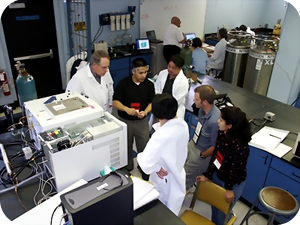Chromatography/Mass Spectrometry Principles and Practice
Format: Classroom and hands-on laboratory experiments
Length: 5 days
Fee: Currently not available
 This intensive, five-day lecture/lab course on mass spectrometry is co-sponsored by and presented at the University of the Pacific in Stockton, California. The lecture portion covers the basics of both LC/MS and GC/MS, including interpretation of mass spectra and practical advice on operation and maintenance of mass spectrometers. The laboratory is supported by the leading Mass Spec vendors especially for this class, affording each student the opportunity to have hands-on experience with state-of-the-art instrumentation. The experiments, however, are not “canned” demonstrations, but are real-life, practical exercises that reinforce the fundamental concepts presented in lecture. Students are assigned to three- to four-person group that they will work with throughout the week to complete homework problems, interpret experimental data, and prepare presentations.
This intensive, five-day lecture/lab course on mass spectrometry is co-sponsored by and presented at the University of the Pacific in Stockton, California. The lecture portion covers the basics of both LC/MS and GC/MS, including interpretation of mass spectra and practical advice on operation and maintenance of mass spectrometers. The laboratory is supported by the leading Mass Spec vendors especially for this class, affording each student the opportunity to have hands-on experience with state-of-the-art instrumentation. The experiments, however, are not “canned” demonstrations, but are real-life, practical exercises that reinforce the fundamental concepts presented in lecture. Students are assigned to three- to four-person group that they will work with throughout the week to complete homework problems, interpret experimental data, and prepare presentations.
The team approach for this course involves three professors, as many as nine graduate student teaching assistants, and representatives from the instrument manufacturers. This format ensures that the student receives a variety of viewpoints and a significant amount of one-on-one attention. This course is the most intense and comprehensive training available for the analyst using chromatography/mass spectrometry.
This course is offered once each summer in California. Course enrollment is limited to 26 students, so sign up early to ensure your place.
You Will Learn A Theoretical and Practical Knowledge of:
- Operating Principles of LC/MS and GC/MS
- Strategies for Data Interpretation – EI, CI, MS/MS, and In-Source CAD
- Ionization Techniques – EI, CI, APCI, APPI, ES, and other techniques
- Inlet-System Interfacing for LC and GC
- Quantitation Using GC/MS and LC/MS
- Instrument Maintenance
- Experimental Design
- Use of computer tools for generating and dealing with LC/MS, GC/MS, and MS/MS data
- Optimization of GC/MS and LC/MS Methods
- MS Requirements for Hyphenated Techniques
- The best modern reference materials for the mass spectrometrist
Laboratory Sessions Offer Top-Quality Training and Individual Attention!
The laboratory sessions include computer analysis of data that you have acquired using various GC/ and LC/MS systems. Small groups of three or four participants and an expert coach will be given a specific problem and acquire the data necessary to solve the problem. You and your group will then make a presentation on your results and conclusions.
Experiments and Exercises Provide Valuable Hands-On Experience in GC/MS and LC/MS!
Laboratory exercises involve data acquired in electron ionization and chemical ionization (EI and CI) for GC/MS and electrospray ionization and atmospheric pressure chemical ionization (ESI and APCI) for LC/MS as well as data acquired in MS/MS. The course deals with chromatographic analytes with a molecular mass to about 1,000 Da. The laboratory sessions challenge your problem solving skills using data that you acquire on the latest modern instruments supplied to this course by our supporting instrument manufacturers.
Other Key Ways You’ll Benefit from Attending this Course
- Consult with expert instructors about your analytical problems and challenges.
- Develop a strategy for interpreting mass spectral data.
- Learn which compounds are amenable to which mass spectral techniques.
- Learn the operating principles of ionization sources, m/z analyzers, and detectors.
- Learn the operating principles of sample inlet systems (direct-probe and GC and LC inlets) and associated vacuum systems.
- Learn how to process data with a data system; appreciate various aspects of tuning and troubleshooting a mass spectrometer.
- Obtain experience in library searching on benchtop data systems and the use of other computer-aided mass spectral interpretation tools.
- Use a vast array of the latest in modern GC/MS and LC/MS instrumentation.
- Become familiar with the complexity and care involved in operating the mass spectrometer with a separation technique.
- Learn the techniques of accessing literature on mass spectrometry research and applications.
Instructors: O. David Sparkman, Fred Klink, and graduate student teaching assistants.
